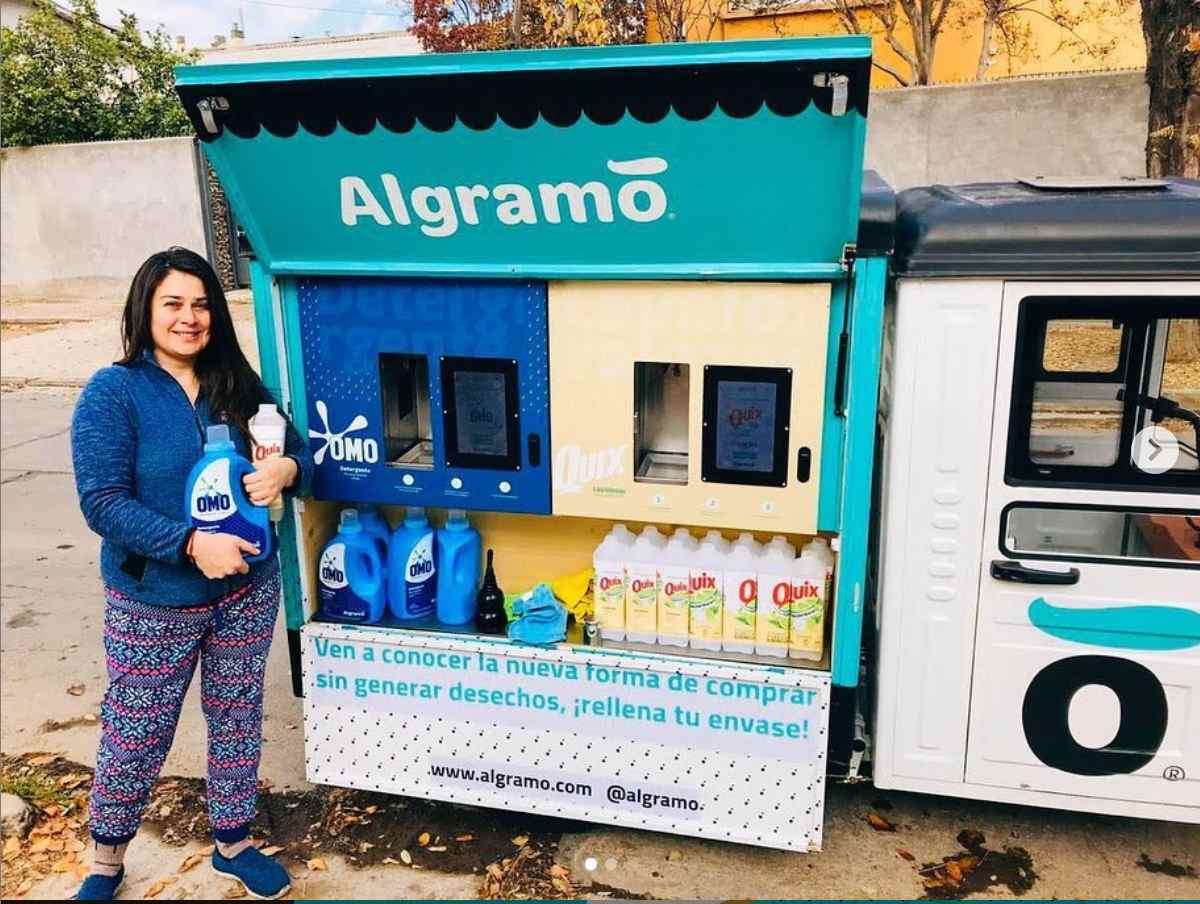Stylish Tiny Homes Are Now Being 3D-Printed In 24 Hours And Shipped to Your Site
Mighty Buildings, an Oakland, California construction company, is 3D-printing entire houses in 24 hours–and they're stylist and cheap.

A Chilean startup is bringing their successful model of cleaning product vending machines to New York City, helping residents save money and avoid single-use plastics.
Buying by weight at a fixed price, can help low-income consumers avoid the higher averaged costs of buying smaller versions of products, when they have limited dollars.
Back in Santiago, Algramo operates electric-tricycles with the vending machines mounted on the back, while in Brooklyn, the idea is to leave them at commonly visited shopping locations such as laundromats.
At the machine, customers can use the Algramno app and digital wallet.
They use reusable bottles with RFID codes to buy as much of the product as they need while receiving a discount if they use the same bottle code again.
The initiative is funded by a grant from Closed Loop Ventures, a New York-based venture capital firm that funnels investment money to startups that contribute to their vision of the circular economy: a strategy in which all waste products are used in other production systems.
Algramo's founder Jose Manuel Moller launched the product in low-income grocery stores selling staples like rice instead of cleaning supplies. Here he recognized one of Algramo's true advantages-the ability to allow consumers cheaper ways to buy in bulk, which can allow Chileans to save 140% on groceries bought in small amounts over a certain period.
LOOK: Young Scientists Make Eco-Friendly Industrial Cleaners From Yeast, Transforming Chemical Industry
This kind of poverty tax is something which low-income earners understand all too well.
"When you buy in small formats, you pay from 30% to 50% more for the product, depending on what the product is," Brian Bauer, who works on the circular economy and strategic alliances at Algramo, told Fast Company.
"And then in doing that, you also produce a lot of packaging waste. That's typically the type of packaging waste that's most likely to escape into the environment because it's smaller format, and it's also in low-resource areas where there aren't very good waste management systems in place. So there's a lot of that packaging that ends up in the environment, ultimately, in oceans or other places it shouldn't be."
A post shared by Algramo (@algramo) on Aug 5, 2020 at 3:45pm PDT
Slated for its Big Apple debut later this year, the rollout of the Algramo machines has been accelerated due to the COVID-19 pandemic, with some partners like Clorox and Colgate-Palmolive already on board.
Buying by weight at a fixed price, can help low-income consumers avoid the higher averaged costs of buying smaller versions of products, when they have limited dollars.
Back in Santiago, Algramo operates electric-tricycles with the vending machines mounted on the back, while in Brooklyn, the idea is to leave them at commonly visited shopping locations such as laundromats.
At the machine, customers can use the Algramno app and digital wallet.
They use reusable bottles with RFID codes to buy as much of the product as they need while receiving a discount if they use the same bottle code again.
The initiative is funded by a grant from Closed Loop Ventures, a New York-based venture capital firm that funnels investment money to startups that contribute to their vision of the circular economy: a strategy in which all waste products are used in other production systems.
Algramo's founder Jose Manuel Moller launched the product in low-income grocery stores selling staples like rice instead of cleaning supplies. Here he recognized one of Algramo's true advantages-the ability to allow consumers cheaper ways to buy in bulk, which can allow Chileans to save 140% on groceries bought in small amounts over a certain period.
LOOK: Young Scientists Make Eco-Friendly Industrial Cleaners From Yeast, Transforming Chemical Industry
This kind of poverty tax is something which low-income earners understand all too well.
"When you buy in small formats, you pay from 30% to 50% more for the product, depending on what the product is," Brian Bauer, who works on the circular economy and strategic alliances at Algramo, told Fast Company.
"And then in doing that, you also produce a lot of packaging waste. That's typically the type of packaging waste that's most likely to escape into the environment because it's smaller format, and it's also in low-resource areas where there aren't very good waste management systems in place. So there's a lot of that packaging that ends up in the environment, ultimately, in oceans or other places it shouldn't be."
A post shared by Algramo (@algramo) on Aug 5, 2020 at 3:45pm PDT
Slated for its Big Apple debut later this year, the rollout of the Algramo machines has been accelerated due to the COVID-19 pandemic, with some partners like Clorox and Colgate-Palmolive already on board.
Algramo is also in talks with different apartment complexes about providing Algramo hand-sanitizer refill stations in shared areas like laundry rooms. They may not delight the appetite in the same way a slurpee machine might, but these vending machines are helping the planet and helping wallets. That's enough.
INFLUENCE Your Friends to Think 'Beyond Plastic' - SHARE On Social Media…
Be the first to comment